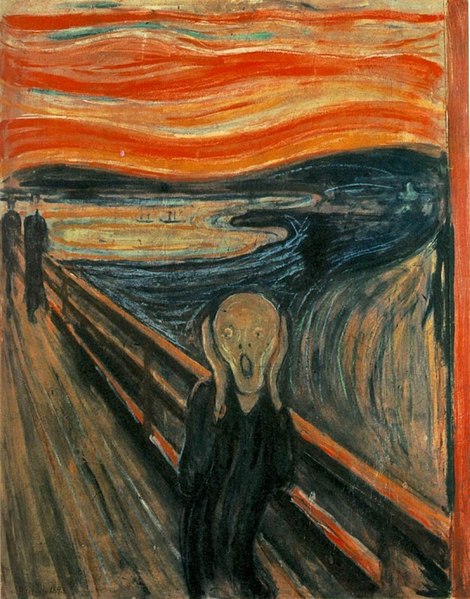Mentioning copyright law to anyone working in the creative
industries and they shudder and immediately dismiss it with 'I don't get it'
and 'it's too complex' and to some degree yes it is but it's there to protect
the intangible in the tangible being of artistic works.
 |
Is this how you feel about copyright?Edvard Munch - The Scream 1910.Fortunately this came out of copyright this year. |
The Museum’s very being lies in its duty to
protect and care for collection of physical objects. We're used to displaying,
packing, storing and conserving tangible things but when it comes to the
intangible idea of copyright Many museum professionals will quickly claim
ignorance, yet copyright law in its basic state is simple –
a material object can be owned by a museum or gallery but its intellectual
property right, its intangible, immaterial rights can belong to another. In the UK
Copyright is assigned to the author of the work at the moment it is created, it
can be literary, dramatic, musical or artistic provided that the work is
original.
It is difficult to get your head round at first, especially at
the introduction of infringements and fair dealings, but the very notion that
guides museum professionals experiences with objects are based in the
non-physical information an object can give us - it's scholarly value, it's
provenance, it's associated costs and the information it tells us about a time
or a culture. So should we really find it such a daunting law?
Well, there is no denying that copyright law can be complex; it
has many layers that mean that you can be liable for infringement by taking a
picture of a painting in an exhibition or downloading an image from a website
for use on social media such as in the case of National Portrait Gallery vs Wikimedia. But what does this mean for museums? As the owners of
the physical artistic works they do not always own the copyright too, this
makes creating exhibition catalogues, images for collections online and press
and marketing a bit more difficult than you may have first though. Along with
strict checks on due diligence and provenance registration staff often have to ask copyright holders permission to ensure that we can take images of the artwork when it is on display, unfortunately this can sometimes even having to spend hours seeking out the correct copyright holder or
licensee to ensure that they are not infringing on its copyright.
Up until last year it was infringement for a museum to even take
preservation copies of works i.e. taking photographs for records management or
condition reports. Thankfully the changes in June 2014 last year have helped museums considerable
and a fair dealing law that makes it possible to preserve any type of copyrighted
work held in the permanent collection. Additionally a new clause that
institutions can allow access to all types of works by electronic means at a ‘dedicated
terminal for research and private study’ however I’m yet
to see an institution do this?
 |
| Description of the points system for judging English rabbits, from The American Pet Stock Standard of Perfection and Official Guide to the American Fur Fanciers’ Association (1915) |
Have patience though, copyright does not last forever. Duration generally
last the lifetime of the author plus seventy years - so I doubt we will still be around when Hirst or Emin's work ocomes out of copyright. But once out of this time frame
the works enter the public domain and each year the fantastic online journal the public domain review (http://publicdomainreview.org/) pick
their fave authors whose work will enter the public domain that year the class of 2015 includes Mondrian, Ian Flemming and Munch.
We as museum professionals love to look after collections
property rights so don’t shy away from looking after their intellectual
property rights too they can be just as important.


No comments:
Post a Comment